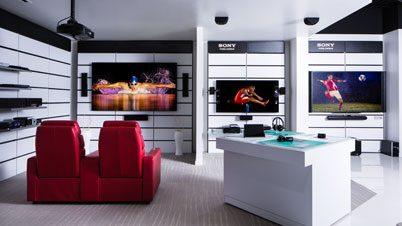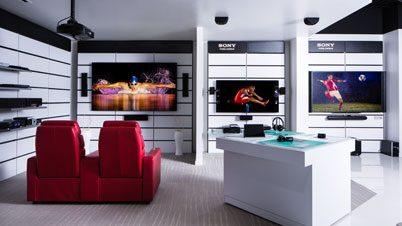

 People outside the AV industry may not realize just how dead things can get in the period of time after the Fourth of July through the end of summer. It's warm outside, kids are out of school, and people are enjoying outdoor activities and taking family vacations. They probably aren't thinking about their next AV upgrade. The good news is, we are only a few weeks away from the return of college football to our airwaves. Soon, the temperature will fall, and people might return to the stereo store for new gear, system upgrades, and more.
People outside the AV industry may not realize just how dead things can get in the period of time after the Fourth of July through the end of summer. It's warm outside, kids are out of school, and people are enjoying outdoor activities and taking family vacations. They probably aren't thinking about their next AV upgrade. The good news is, we are only a few weeks away from the return of college football to our airwaves. Soon, the temperature will fall, and people might return to the stereo store for new gear, system upgrades, and more.
Since the real estate collapse of 2008, the landscape has changed dramatically for traditional AV dealers. When real estate was booming and the banks were lending money to anyone, the CEDIA-type installer/dealer was booming, but that crapped out with the real estate market, and many installers never returned to the business. Traditional brick-and-mortar AV dealers pulled back, as more and more TVs and mainstream electronics product were sold through Costco, Walmart, Target, and Amazon. Today, with big U.S. cities like New York, San Francisco, San Jose, and Los Angeles bubbling with economic growth and a new real estate boom, perhaps it's time for a return of the great stereo store: a place where enthusiasts meet, learn, and buy gear. A highly functional stereo store is a complex balance of community, business, hobby, and more. It's something that should be embraced by those who are enthusiastic about the business or the hobby.
Here are five new-school ideas to help reinvigorate brick-and-mortar AV dealers for the coming fall/winter sales season.
1. Invest in Inventory.
Dolby Atmos and DTS:X are incredible new technologies that make 7.1 surround sound seem pretty lame by comparison. They do, however, require investments in more speakers, more electronics, and additional labor. A hot DTS:X demo is something you simply can not get at Costco or Target. They sell gear in boxes via clerks who can't demonstrate what a special experience it is to hear Gravity or American Sniper in Dolby Atmos. That's the type of stuff people need to experience to know that they want it. It's visceral. It's physical. Consumers need to get the wow factor shown to them so that they say, "This winter I am going to get that...." Without the demo, good luck on landing the killer theater sales.
For audiophile sales, even if there are fewer systems/gear on display, make sure that key components, parts, and cables are in stock. Commissioned salespeople sell things that they can make money on today. In the past 10 years, AV stores have become too risk-adverse. They want to cut overhead in any way possible, but investing in inventory helps create sales and motivate staff. Get key components in stock, keep them in stock, and don't be shocked when they actually start selling all season long.
2. Fire All Salaried Salespeople.
This is the reverse of how Circuit City failed. They canned all of their top commissioned salespeople to try to play with their stock price ,which worked for about a quarter until they realized that they were in the death spiral and couldn't stop from ultimately going Chapter 7. Overhead is a bitch, and salaries are a big part of that for many AV stores. I am suggesting that dealers put their top people on commission-only programs that allow them to actually make a lot more money than a safer "draw" or salaried program. These employees need to feel a little uneasy. They need to be motivated to be on the phone or in the car on the way to an in-home demo for an audiophile client on a Wednesday afternoon.
Big-box stores don't have salespeople who are trained or motivated to sell, and it shows. Most AV companies have strong training programs, and people who make their living selling top-performing AV gear always benefit from such training. If AV dealers want to whoop the big-box retailers, having professionals--not clerks--working on the floor is a great place to start. As good as some of the Internet AV brands are with customer service, they can't compete with a highly motivated, well-trained salesperson and support staff.
3. Offer Added Values.
Enlightened AV dealers need to look at purchases through the optics of their consumer. Amazon Prime members can get free two-day shipping on many products, which can be quite useful. What can the local AV dealer offer that Amazon can't? How about a FREE extended warranty on electronics (they aren't that expensive in the scope of things). How about a $100 video calibration for any TV sale over $1,000? How about a nice pair of headphones included with any audio sale over $1,000? How about e-waste recycling for old gear (especially old CRT projectors)? How about donations to local charities like local schools who are in need of AV equipment?
Trade-in programs are also very helpful. How about dealers offering customers who want to upgrade their more audiophile-grade gear free Audiogon.com or Ebay.com support? For example, if you buy a new Bla Bla Bla Audio XYZ preamp, we will come to your house, clean up your old unit, test it, and professionally pack it--we'll even service it if needed before it goes up for sale. They customer just sits back and lets the dealer do the work. The dealer is more likely to get a high-dollar sale because he has made it THAT easy to upgrade. Can Amazon offer you such a service? Walmart? I don't think so.
 4. Expand Beyond AV.
4. Expand Beyond AV.
One of my favorite stores in America is Starpower, based in Dallas. They sell traditional AV gear, and they install custom AV, automation, shades, lighting, and a lot of what your typical CEDIA installer might sell. However, they also go deeper. Way deeper. Starpower sells kitchen appliances from the best brands like Sub Zero, Wolf, and Viking. They sell flooring. They sell carpeting. They sell design services. They sell networking. They sell pretty much everything you need for your home...not just the TV.
I am not suggesting that every traditional AV dealer become a Sub Zero franchisee, but I am suggesting that getting into topics like power over IP, home networking, enterprise-class Internet and switching, fiber-optic installation, and whole-home professional wireless systems offer the consumer key value. A modestly wealthy client might want better Internet performance and reliability for their home. They might want more access points for their family's growing data needs. That Time Warner or Comcast cheapie Internet router might not get the job done the way one from a company like Ruckus or  Pakedge does. Using this "in," the AV dealer/installer becomes the network expert for the house, which once again is more valuable to all of the customers who live in the home. Yes, it takes time and money to learn these new skill sets, but times are changing, and the need for data, security, and networking are only just beginning.
Pakedge does. Using this "in," the AV dealer/installer becomes the network expert for the house, which once again is more valuable to all of the customers who live in the home. Yes, it takes time and money to learn these new skill sets, but times are changing, and the need for data, security, and networking are only just beginning.
5. Actually Explain the Business to Customers.
Having an honest conversation with one of your best clients about what you can do for them and how they can support you is simply good business. A dealer needs to understand that a client might purchase an iPad or small TV on Amazon.com from time to time; but, in order to offer the best, most attentive, enlightened sales support and service, the client needs to support the dealer with the larger sales. When good work is being completed, the dealer needs recommendations for other jobs. It is a healthy cycle for a sustainable business. Too often consumers get angry about prices or lack of demos or whatever, and that's paired with dealers who think consumers always want 20 percent off and tons of attention. Clearly, there is a common ground to be found, and an open dialogue is a good way to begin...starting with a dealer's best legacy clients.
Despite changes in the sales chain in the consumer electronics business over the past 10 years, customers still like going to retailers who know their stuff and can demonstrate complicated technologies with ease and professionalism. Systems are different today than just a few years ago, and so is they way they are sold. Every city in America has the opportunity to have a showcase dealer or two that really gets the way of the new world. A dealer that earns the business of the enthusiast consumer on every level, leaving him or her very happy. For the dealer, the pot of gold is a big one if done right. Millions of dollars of sales are sitting out there for the taking.
Consumers, what would it take for you to return to your local AV dealer or start working with a new-school one? Dealers, what upgrades have you made to your business and/or business model to compete in a new era of AV, networking, and beyond? Comment below, as we want to hear from you.
* Images courtesy of Starpower
Additional Resources
• Would You Go to an Audiohile Pop-Up? at HomeTheaterReview.com.
• Should Some Audiophile Products Be Sold on a Limited-Edition Basis? at HomeTheaterReview.com.
• Should You Open a Stereo Store? at HomeTheaterReview.com.